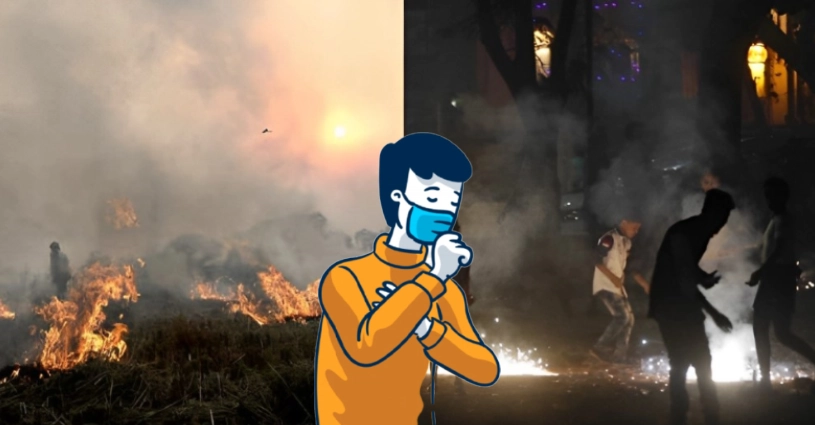Punjab, known for its lush fields and vibrant culture, is currently grappling with a severe environmental issue - a sharp increase in Air Quality Index (AQI) levels. While the state has been plagued by air pollution issues for years, the situation has taken a turn for the worse, with AQI levels reaching alarming heights.
This surge in pollution is not only a result of various factors but also poses a significant threat to the health and well-being of its residents.
Factors leading to the AQI crisis:
Parali burning on the rise:
One of the primary culprits behind the deteriorating air quality in Punjab is the burning of parali (crop residue) by farmers. The incidents of parali burning have risen by a staggering 43% compared to the previous year, and a shocking 67% compared to 2021. This practice releases a significant amount of pollutants into the atmosphere, contributing to the smog and worsening air quality.
Festival season impact:
As the festival season approaches, there is a growing concern that air quality could deteriorate further. The burning of firecrackers during festivals, such as Diwali, is a major contributor to air pollution. Additionally, the weather conditions during this time of the year can trap pollutants in the atmosphere, creating a smoggy and hazardous environment.
The AQI situation: Ludhiana and Jalandhar
Ludhiana's alarming AQI
The city of Ludhiana has witnessed an alarming rise in AQI levels, especially during the nighttime when the AQI has surged to 328. This is a clear indicator of the worsening air quality, which poses serious health risks to the residents.
Jalandhar's struggle
Jalandhar, another major city in Punjab, is also grappling with deteriorating air quality. The city has consistently reported an average AQI of 135, indicating a polluted atmosphere. Residents in both Ludhiana and Jalandhar are facing the immediate consequences of the increasing pollution levels.
Safety measures for residents:
In the face of the rising AQI crisis, residents of Punjab must take proactive steps to protect their health and well-being. Here are some safety measures to consider:
1. Avoid outdoor activities: Limit your outdoor activities, especially during early morning and late evening when pollution levels tend to be higher.
2. Use air purifiers: Install air purifiers in your homes to improve indoor air quality and reduce exposure to pollutants.
3. Wear masks: When venturing outside, wear N95 or equivalent masks to filter out harmful particles from the air.
4. Support sustainable farming practices: Encourage and support farmers in adopting sustainable farming practices that eliminate the need for parali burning.
5. Celebrate eco-friendly festivals: Opt for eco-friendly alternatives during festivals and avoid bursting firecrackers to reduce pollution.
6. Stay informed: Keep track of AQI levels in your area through reliable sources and take necessary precautions accordingly.
Conclusion
Punjab's escalating AQI crisis demands urgent attention and action from both authorities and residents. The combined efforts of the government, farmers, and the public are essential to combat air pollution and safeguard the well-being of the state's inhabitants.
As the festival season approaches, responsible choices and sustainable practices can help mitigate the impact on air quality and create a healthier environment for all.
